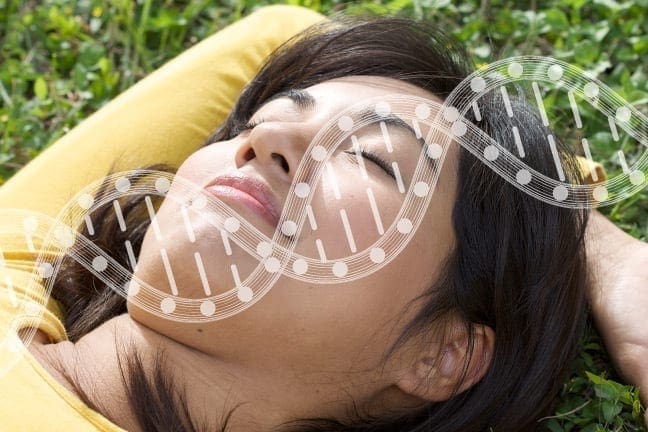Will luck be a lady when it comes to aging?According to an April 2013 study published in Journal Watch Dermatology, luck isn’t so much a lady as it is a gene.While it’s widely accepted that people with inherited Fitzpatrick skin types V and VI (which correspond with more melanin and deeper complexions) enjoy more natural protection from the sun’s damaging rays than the fairer types I and II, the expression of aging through symptoms like sun spots, wrinkling and sagging can still vary dramatically within each skin type group.MORE: How to Reverse Sun DamageTo explore a possible connection between genes and aging caused by the sun, a study was conducted on 502 French, middle-aged Caucasian women. A six-point scale scored facial photographs for the presence of wrinkling, sagging and pigmentation. Factors like age, smoking history, hormonal status, body-mass index and estimated lifetime sun exposure were controlled.Using the data, scientists, for the first time, appeared to isolate genes that correlate with stronger resistance to photoaging. “The study shows that some genes are protective when it comes to the skin’s reaction to UV light exposure, and people with this particular gene may be less affected by exposure than other people,” explains Joshua Zeichner, M.D., director of cosmetic and clinical research at Mount Sinai’s department of dermatology.QUIZ: How Healthy is Your Skin?That means that family history may figure in as prominently with aging as it does with other areas of health, though lifestyle factors can still weigh in more heavily. “You may be able to look at mom or grandma to guess how you might age, but it’s best not to take chances by skipping your sunscreen,” warns Zeichner.In addition to diligently wearing SPF 30 or more daily, healthy anti-aging habits include eating an antioxidant-rich diet that is low in inflammatory items like refined sugars, limiting direct sun exposure, managing stress, keeping skin moisturized and getting your beauty sleep.“Genetics don’t determine your destiny—they just predispose you to certain things,” says YouBeauty dermatology expert, Jeanine B. Downie, M.D. “But what you make of what you’re given is still up to you.”VIDEO: The Damaging Effects of Too Much Sun
© YouBeauty 2024




































